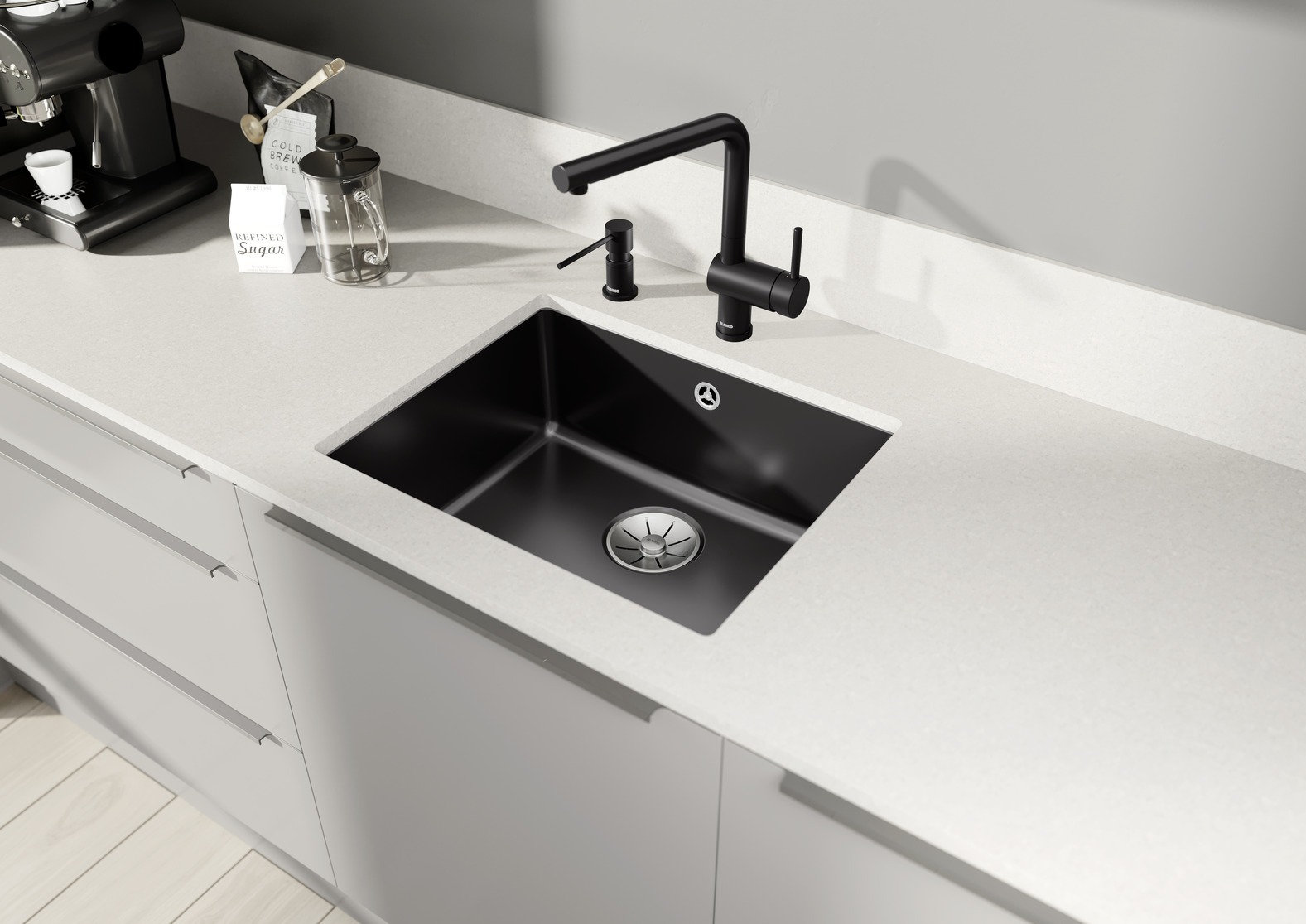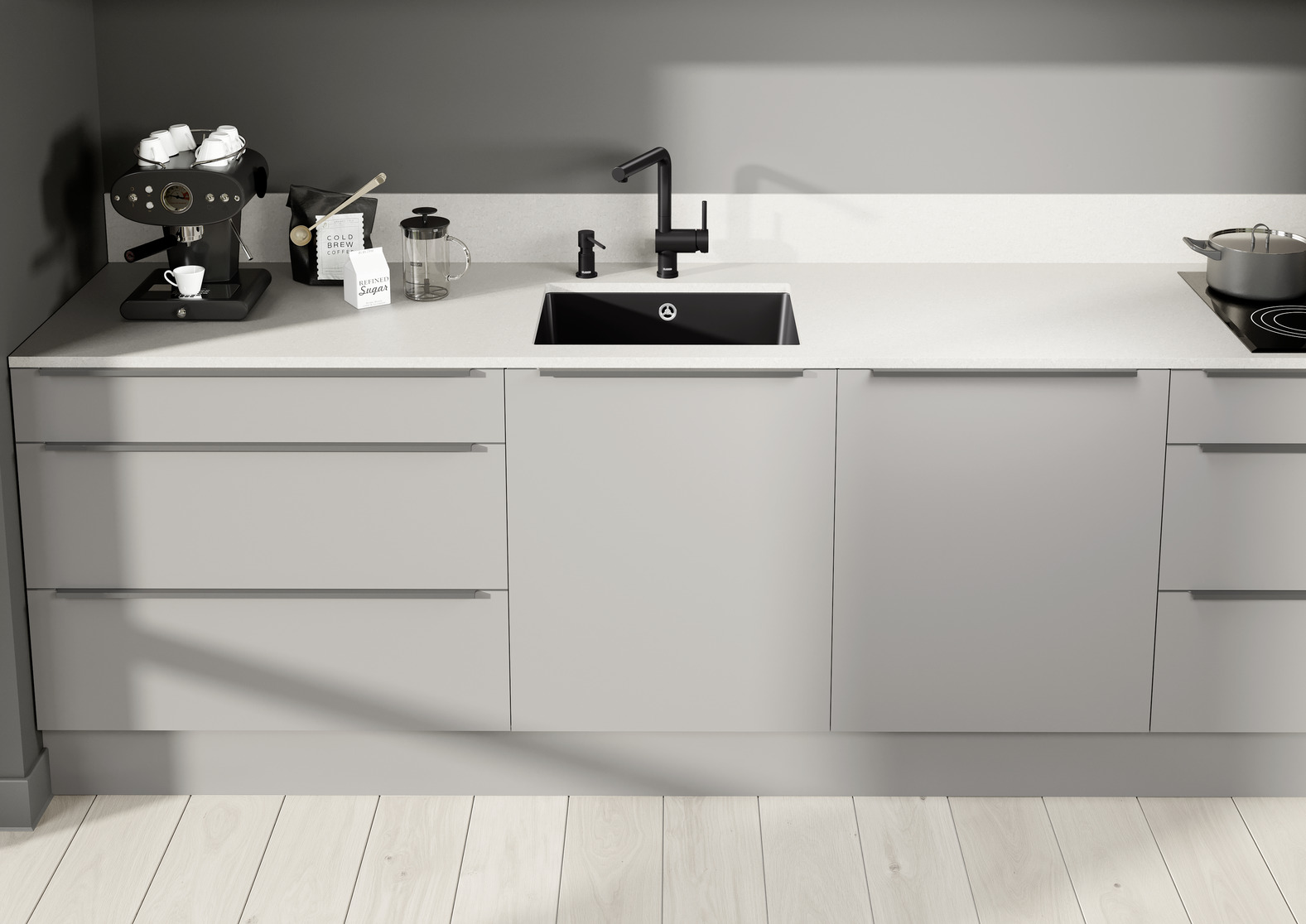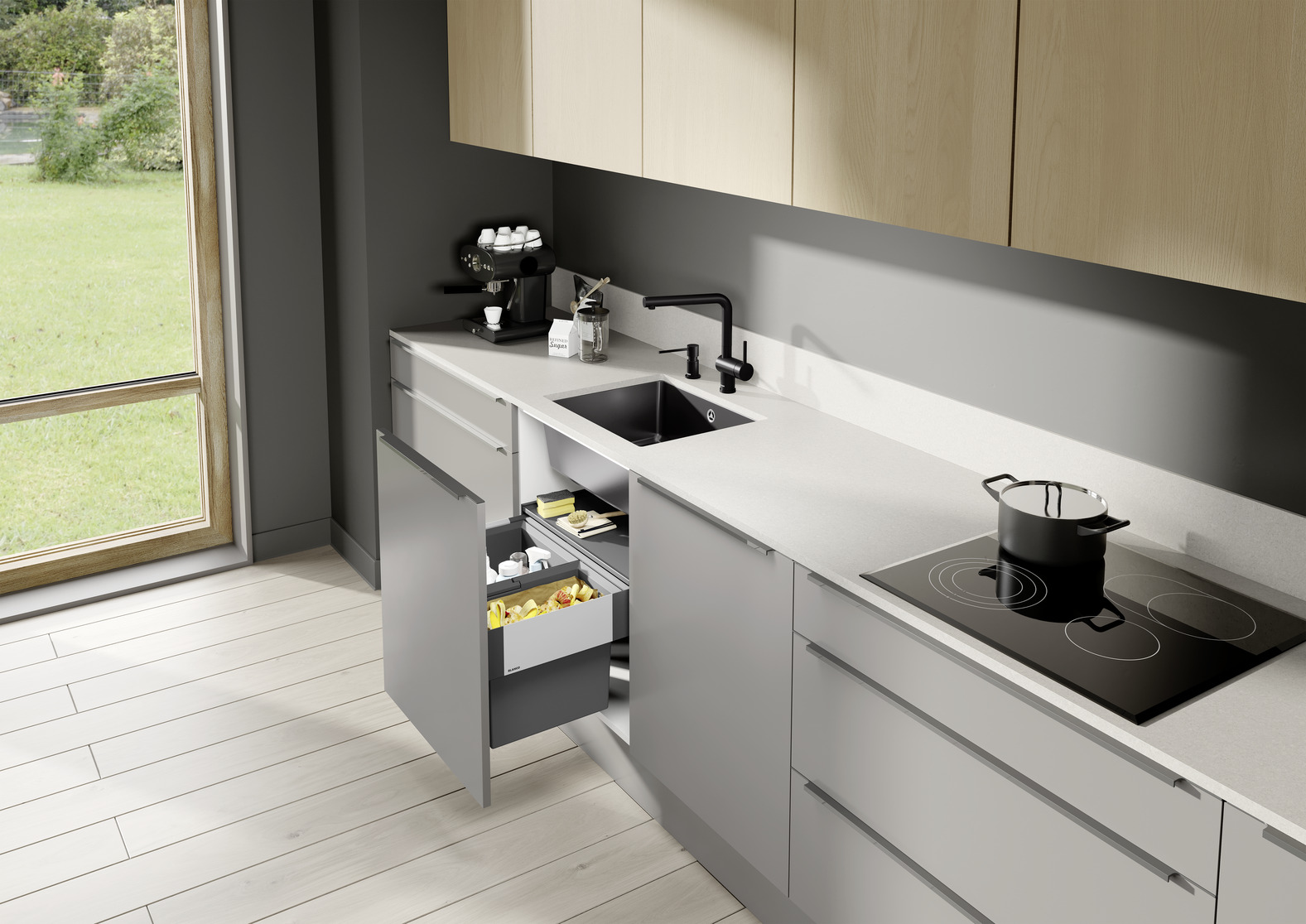SUBLINE 500-U
- Undermount bowl for solid surface worktops
- Timelessly elegant, contoured bowl design
- Wide range featuring large and small bowls
- Elegant and hygienic: the covered C-overflow and InFino strainer system
- Ceramic for easy care





Ceramic PuraPlus crystal white gloss
Item no. 523733
They are the ultimate synthesis of nature and design, as we make our ceramic sinks from natural raw materials. This means that every sink is a unique piece – including yours. This is apparent from the look and feel every time you come into contact with it. Delicate forms, tasteful accents and full-bodied colours charm not only the eye, but also bring magic to the heart of your kitchen. Above all, this is down to the expertise and care taken by our employees. They always create sinks that meet the highest standards, with patience and precision. The natural character of ceramic sinks gives them certain tolerances that we observe and check meticulously.
Cutting, chopping and heat: things can really hot up in your kitchen. And that’s precisely when your ceramic sink shows just what it can do. Its high-quality workmanship allows it to rise to any challenge, thanks to its hard and robust surface, which makes your sink scratch- and cut-resistant. What’s more, it is shock-resistant. However, you shouldn’t take that as an invitation to treat it roughly. Exceptionally large and heavy objects should not be dropped onto its surface from a height. This would leave a mark on even this robust sink.
When vegetables, meat and fruit have all done their worst on the ceramic sink, you’d expect to be faced with something of a disaster. But you don’t need to worry about all that with your ceramic sink. The smooth and completely unbroken surface ensures that no dirt can settle on it. What’s more, any soiling that is visible after long cooking sessions is easy to tackle. Just get a soft sponge, a little washing-up liquid and warm water, and wipe it away. A microfibre cloth is best for rubbing it dry. However, steer clear of scouring agents, steel brushes and aggressive mixer tap cleaners containing chlorine. Your ceramic sink won’t like these at all.
You won’t want to do things by halves when it comes to cleaning your house. If you want to get your space spotlessly clean, from your living room to your kitchen, then you\'re going to use using cleaning agents – standard household cleaners, alkaline and acid solutions. Your ceramic sink is fairly forgiving. If acids or alkalis accidentally find their way into the sink, you can simply carry on with your cleaning. After all, our sinks are resistant to these substances.
If you have ever needed to take a boiling hot pot of pasta off the stove, you’re bound to have asked yourself, “Now, where can I put this?” Your ceramic sink provides plenty of space for such eventualities. After all, it is outstandingly heat-resistant, so high temperatures cannot damage it. As such, you won’t have to worry about discolouration or bleaching. Sizzling pans and hot pots at up to 280 degrees can simply be taken off the stove and placed directly in the sink.
Not only are our ceramic sinks ideal for day-to-day washing up, but they also provide a space to chop up tomatoes, meat and garlic. The material makes it ideal as a place for food. The smooth, non-porous surface prevents food remains from getting stuck. Light soiling caused by cutting, frying or cooking on nearby utensils is easily remedied. It can be eliminated even faster than it appeared with a soft sponge, a little washing-up liquid and warm water. This means no unpleasant smells or unsightly discolouration on your sink.
Our ceramic sinks are non-fade. This means that you can install your sink in a bright room or in front of a window. Direct sunlight doesn’t pose any problem, so the colour of your sink will stay just as it was when you got it, for years to come. By the same token, standard household use of your sink will not alter its colour. If your sink sees a lot of use, light limescale deposits may form over time. When combined with foodstuffs like coffee or red wine, this can cause slight discolouration. But there’s no need to panic: you can address the problem in a matter of minutes. In this case, use vinegar concentrate or a professional biological cleaner such as our BLANCO ANTIKALK. Soon you’ll see that you were worrying about nothing.
If time-consuming cleaning marathons really aren’t your thing, rest easy: your ceramic sink is very low-maintenance. Just putting some warm water and washing-up liquid on a soft sponge and cleaning your kitchen sink with it every day will do the trick. Limescale is best avoided by rubbing your sink dry with a microfibre cloth afterwards. If you find stubborn dirt on your otherwise spotlessly clean sink, it’s best to opt for a professional cleaning agent. BLANCO PuraPlus Liquid goes a good job of pre-cleaning worktops that require extra effort. This cleaner removes limescale deposits and metal abrasion, without being too taxing. Fast and straightforward In order to ensure that water continues to roll off your sink, it’s worth using a care product like BLANCO CeraCare, which both cleans and nourishes the surface. This will re-seal the surface of your sink. Avoid scouring agents, aggressive drain cleaners and scratchy brushes or steel sponges. These will damage the pristine surfaces. What’s more, they could cause the sink to lose its lovely shine.
We do our bit to make sure that you’re all set up, so our stainless steel and ceramic sinks come with a punched-out tap hole. This means that you won’t have to do any extra work before installing it. Silgranit sinks are milled from the underside. You simply have to knock through the pre-milled holes. How to do it: first place the sink in a sturdy holder. Now take a punch and place it in the middle of the mark. Use a hammer to hit the punch holes for the mixer tap, soap dispenser and drain remote control, as required, without exerting force on the punch itself. Then carefully knock the rest of the Silgranit pieces out of their marked holes. Now get a file and file the hole to the right size. You may need to do this if the hole is flush with the preliminary milling. Now there’s only one thing left to do: insert your mixer tap, and off you go.
Milky patches can soon show up on your stylish dark sink. These are caused by limescale deposits, which can vary hugely from place to place, and depending on the state of your water pipes. Such stains also pick up deposits from substances like tea or coffee, and are thus responsible for discolouration. But all this isn’t as bad as it sounds. Luckily, BLANCO ANTIKALK, a little vinegar-based cleaner or diluted citric acid and hot water can come to your rescue. The limescale will dissolve if you clean your kitchen sink thoroughly with these substances. If you don’t want to constantly have to contend with unsightly marks, be sure to dry your sink off with a microfibre cloth after every use. Doing this will prevent the limescale from occurring in the first place.
The basket strainer in the secret hero in your sink. After all, it prevents your sink from getting clogged up, thus ensuring perfect functionality. Over time, however, the basket strainer will collect some dirt, so you should give it a clean every now and then. You don’t even have to buy a special cleaner for that purpose. Here’s our trick: put a level teaspoon of powdered dishwashing detergent onto the closed basket strainer. Pour approx. 250 ml boiling water over it and leave the solution to work. Now brush and scrub it (e.g. with a dishwashing brush) until the basket strainer and drain cup are shining once again. Finally, open up the basket strainer and take out the basket insert. Now you have room to clean the hole opening in the drain cup. Once this is squeaky clean too, reinsert the basket insert and rinse it with clean water.